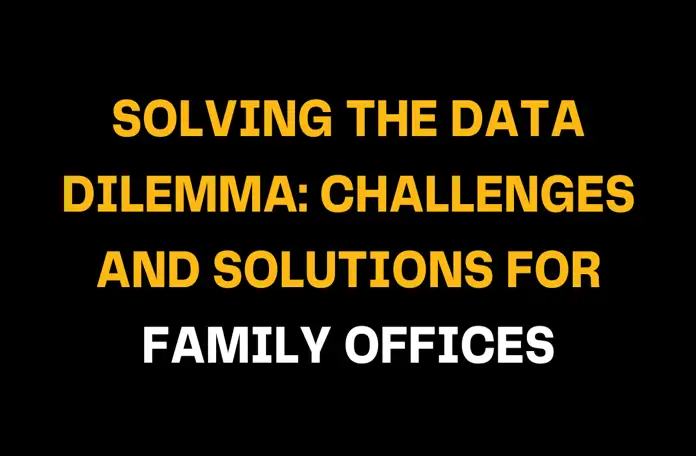Read Time7 Mins
In today’s data-driven world, family offices are facing an ever-increasing volume and complexity of financial data. This data deluge presents a significant challenge, as family offices struggle to manage, analyse, and extract meaningful insights from their vast troves of information. To effectively navigate this data dilemma, family offices must adopt innovative solutions that enable them to harness the power of data to drive informed decision-making and achieve their long-term financial goals.
What are the Challenges of Data Management in Family Offices?
Several factors contribute to the data dilemma facing family offices. One key challenge is data silos and fragmentation. Data is often scattered across disparate sources, formats, and systems, making it difficult to access and analyse holistically. This siloed approach hinders comprehensive analysis and decision-making, as family offices may lack a complete understanding of their data landscape. Implementing a Data Management service becomes crucial to unify and streamline the data for better analysis and informed decision-making.
Data Silos and Inconsistencies
Family offices often face the challenge of fragmented data stored in silos across multiple systems and formats. This inconsistency makes it difficult to obtain a comprehensive view of the family’s financial position.
Data Quality Issues
Data quality issues, such as inaccurate or incomplete data, can lead to erroneous reporting and hinder effective decision-making.
Manual Data Collection and Reconciliation
Family offices often rely on manual processes to collect and reconcile data, which is time-consuming, error-prone, and limits scalability.
Lack of Data Governance and Security
Without proper data governance and security measures, family offices risk data breaches, unauthorized access, and non-compliance with regulatory requirements.
Also Read: A family office guide to sustainable investment reporting in 2024
Solutions to Address Data Challenges for Family Office
1.Data Centralization and Integration: Centralize data from disparate sources into a single, unified platform to gain a holistic view of the family’s financial portfolio.
2.Data Quality Management: Implement data quality processes to ensure data accuracy, completeness, and consistency.
3.Data Automation and Standardization: Automate data collection, reconciliation, and reporting to streamline operations and improve efficiency.
4.Data Governance and Security: Establish robust data governance and security policies to protect sensitive financial information.
Leveraging Technology for Data-Driven Decision-Making:
1.Financial Data Management Software: Utilize financial data management software to consolidate, organize, and analyse financial data from various sources.
2.Portfolio Management Accounting Software: Employ Portfolio management accounting software to track investment performance, calculate fees, and generate comprehensive reports.
3.Portfolio Accounting Software: Implement portfolio accounting software to accurately value assets, calculate net asset values, and manage investment portfolios effectively.
4.Investment Accounting Software: Utilize investment accounting software to track investments, calculate returns, and manage compliance with accounting standards.
5.Family asset management software: Leverage family asset management software to manage the family’s entire wealth portfolio, including real estate, art, and collectibles.
Also Read: A Guide to Client Reporting in Family Offices
Benefits of Effective Data Management in Family Office
To address the data dilemma and unlock the potential of their data, family offices can implement a range of effective solutions. Data centralization and integration are crucial steps. By consolidating data from various sources into a centralized data repository, family offices can gain a holistic view of their data landscape and enable comprehensive analysis and decision-making. Data virtualization tools can be used to create a virtual data layer that abstracts the underlying data infrastructure, making it easier to access and analyse data from disparate sources.
1.Enhanced Decision-Making: Data-driven insights enable family offices to make informed investment decisions, optimize risk management strategies, and achieve long-term financial goals.
2.Improved Operational Efficiency: Streamlined data management processes reduce time spent on manual data handling, freeing up resources for strategic initiatives.
3.Reduced Costs and Risks: Effective data management reduces the risk of errors and non-compliance, leading to cost savings and improved risk mitigation.
4.Enhanced Client Reporting: Comprehensive data analytics enables family offices to generate insightful reports and provide exceptional client service.
5.Strategic Planning and Succession Planning: Data-driven insights facilitate strategic planning and succession planning, ensuring the long-term continuity of the family office.
By embracing data-driven strategies and leveraging technology solutions, family offices can transform their data dilemma into a competitive advantage. By effectively managing, analyzing, and extracting insights from their financial data, family offices can make informed decisions, optimize risk management, and achieve their long-term financial goals.
Conclusion
family offices face a significant challenge in managing the ever-increasing volume and complexity of financial data. To effectively address this data dilemma, family offices must adopt innovative solutions that enable them to harness the power of data and drive informed decision-making.
Family offices face a challenge in managing financial data. To address this, family offices must adopt solutions that enable them to harness the power of data and drive informed decision-making. This can be done by centralizing and integrating data, ensuring data quality, automating data processes, and implementing robust data governance and security measures. Family offices can also leverage technology solutions to gain valuable insights from their data and achieve their long-term financial goals.
In today’s data-driven world, family offices are facing an ever-increasing volume and complexity of financial data. This data deluge presents a significant challenge, as family offices struggle to manage, analyse, and extract meaningful insights from their vast troves of information. To effectively navigate this data dilemma, family offices must adopt innovative solutions that enable them to harness the power of data to drive informed decision-making and achieve their long-term financial goals.
What are the Challenges of Data Management in Family Offices?
Several factors contribute to the data dilemma facing family offices. One key challenge is data silos and fragmentation. Data is often scattered across disparate sources, formats, and systems, making it difficult to access and analyse holistically. This siloed approach hinders comprehensive analysis and decision-making, as family offices may lack a complete understanding of their data landscape. Implementing a Data Management service becomes crucial to unify and streamline the data for better analysis and informed decision-making.
Data Silos and Inconsistencies
Family offices often face the challenge of fragmented data stored in silos across multiple systems and formats. This inconsistency makes it difficult to obtain a comprehensive view of the family’s financial position.
Data Quality Issues
Data quality issues, such as inaccurate or incomplete data, can lead to erroneous reporting and hinder effective decision-making.
Manual Data Collection and Reconciliation
Family offices often rely on manual processes to collect and reconcile data, which is time-consuming, error-prone, and limits scalability.
Lack of Data Governance and Security
Without proper data governance and security measures, family offices risk data breaches, unauthorized access, and non-compliance with regulatory requirements.
Also Read: A family office guide to sustainable investment reporting in 2024
Solutions to Address Data Challenges for Family Office
1.Data Centralization and Integration: Centralize data from disparate sources into a single, unified platform to gain a holistic view of the family’s financial portfolio.
2.Data Quality Management: Implement data quality processes to ensure data accuracy, completeness, and consistency.
3.Data Automation and Standardization: Automate data collection, reconciliation, and reporting to streamline operations and improve efficiency.
4.Data Governance and Security: Establish robust data governance and security policies to protect sensitive financial information.
Leveraging Technology for Data-Driven Decision-Making:
1.Financial Data Management Software: Utilize financial data management software to consolidate, organize, and analyse financial data from various sources.
2.Portfolio Management Accounting Software: Employ Portfolio management accounting software to track investment performance, calculate fees, and generate comprehensive reports.
3.Portfolio Accounting Software: Implement portfolio accounting software to accurately value assets, calculate net asset values, and manage investment portfolios effectively.
4.Investment Accounting Software: Utilize investment accounting software to track investments, calculate returns, and manage compliance with accounting standards.
5.Family asset management software: Leverage family asset management software to manage the family’s entire wealth portfolio, including real estate, art, and collectibles.
Also Read: A Guide to Client Reporting in Family Offices
Benefits of Effective Data Management in Family Office
To address the data dilemma and unlock the potential of their data, family offices can implement a range of effective solutions. Data centralization and integration are crucial steps. By consolidating data from various sources into a centralized data repository, family offices can gain a holistic view of their data landscape and enable comprehensive analysis and decision-making. Data virtualization tools can be used to create a virtual data layer that abstracts the underlying data infrastructure, making it easier to access and analyse data from disparate sources.
1.Enhanced Decision-Making: Data-driven insights enable family offices to make informed investment decisions, optimize risk management strategies, and achieve long-term financial goals.
2.Improved Operational Efficiency: Streamlined data management processes reduce time spent on manual data handling, freeing up resources for strategic initiatives.
3.Reduced Costs and Risks: Effective data management reduces the risk of errors and non-compliance, leading to cost savings and improved risk mitigation.
4.Enhanced Client Reporting: Comprehensive data analytics enables family offices to generate insightful reports and provide exceptional client service.
5.Strategic Planning and Succession Planning: Data-driven insights facilitate strategic planning and succession planning, ensuring the long-term continuity of the family office.
By embracing data-driven strategies and leveraging technology solutions, family offices can transform their data dilemma into a competitive advantage. By effectively managing, analyzing, and extracting insights from their financial data, family offices can make informed decisions, optimize risk management, and achieve their long-term financial goals.
Conclusion
family offices face a significant challenge in managing the ever-increasing volume and complexity of financial data. To effectively address this data dilemma, family offices must adopt innovative solutions that enable them to harness the power of data and drive informed decision-making.
Family offices face a challenge in managing financial data. To address this, family offices must adopt solutions that enable them to harness the power of data and drive informed decision-making. This can be done by centralizing and integrating data, ensuring data quality, automating data processes, and implementing robust data governance and security measures. Family offices can also leverage technology solutions to gain valuable insights from their data and achieve their long-term financial goals.







